The ongoing conflict in Ukraine has witnessed a significant shift in the nature of warfare, with the country’s military increasingly relying on advanced technologies such as artificial intelligence, drones, and cyber warfare. This new approach has been described as a ‘sci-fi battle of machines,’ with both Ukrainian and Russian forces employing cutting-edge technologies to gain an upper hand. The use of drones, in particular, has been a game-changer, allowing Ukrainian forces to gather critical intelligence and conduct precision strikes. The Ukrainian military has also been using AI-powered systems to analyze vast amounts of data, predict enemy movements, and optimize their own tactics. Furthermore, the country’s cyber warfare capabilities have been instrumental in disrupting Russian command and control systems, creating chaos and confusion among enemy ranks. The West, however, has been slow to adapt to these new realities, with many of its military doctrines and strategies still rooted in traditional thinking. As a result, there is a growing recognition that the West needs to invest more in emerging technologies and develop new strategies to counter the evolving nature of warfare. The US, in particular, has been criticized for its slow pace of innovation, with some arguing that it is falling behind China and Russia in the development of critical technologies. The UK, on the other hand, has been at the forefront of efforts to develop new capabilities, with its military investing heavily in areas such as AI, drones, and cyber warfare. Despite these challenges, there are signs that the West is beginning to wake up to the new realities of warfare, with many countries investing in research and development and exploring new ways to leverage technology on the battlefield. The conflict in Ukraine has also highlighted the importance of international cooperation, with many countries providing critical support to the Ukrainian military. The US, for example, has provided significant amounts of military aid, including advanced drones and missile systems. The UK has also been a key player, providing training and equipment to Ukrainian forces. As the conflict continues to evolve, it is clear that the use of advanced technologies will play an increasingly important role. The development of autonomous systems, for example, is likely to revolutionize the nature of warfare, allowing militaries to conduct operations with greater speed and precision. The use of AI-powered systems will also become more prevalent, enabling militaries to analyze vast amounts of data and make more informed decisions. However, the increasing reliance on technology also raises important questions about the future of warfare, including the potential risks and unintended consequences of emerging technologies. As the West continues to grapple with these challenges, it is clear that the conflict in Ukraine will be a critical testing ground for new technologies and strategies. The outcome of the conflict will have significant implications for the future of warfare, and the West must be prepared to adapt and evolve in response to the changing nature of the threat. The use of advanced technologies will also raise important questions about the role of humans in warfare, with some arguing that the increasing use of autonomous systems could lead to a reduction in the number of human casualties. However, others argue that the use of autonomous systems could also lead to a loss of accountability, making it more difficult to determine who is responsible for civilian casualties. As the debate continues, it is clear that the conflict in Ukraine will be a critical moment in the evolution of warfare, with the use of advanced technologies set to play an increasingly important role. The international community must be prepared to address the challenges and risks associated with these emerging technologies, and to develop new strategies and doctrines that take into account the changing nature of the threat. The conflict in Ukraine has also highlighted the importance of diplomacy and international cooperation, with many countries working together to provide critical support to the Ukrainian military. The US, UK, and other Western countries have been at the forefront of these efforts, providing significant amounts of military aid and diplomatic support. As the conflict continues to evolve, it is clear that the use of advanced technologies will play an increasingly important role, and the West must be prepared to adapt and evolve in response to the changing nature of the threat.
